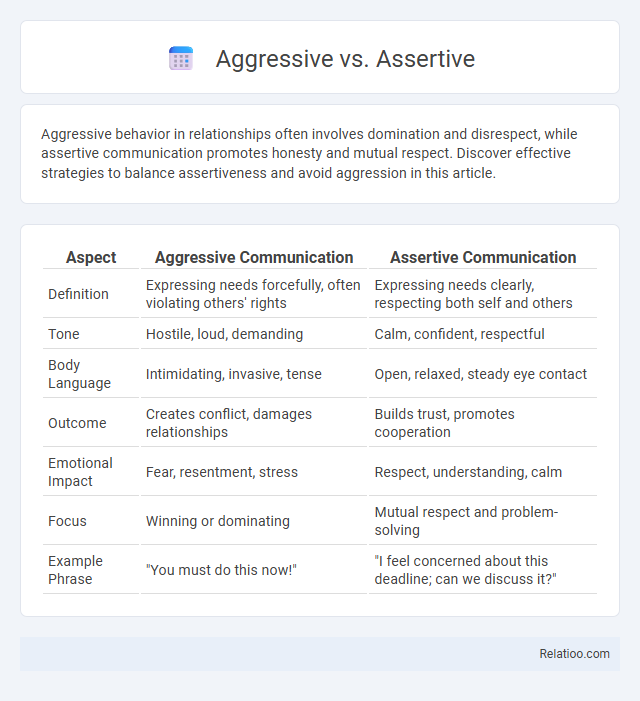Aggressive behavior in relationships often involves domination and disrespect, while assertive communication promotes honesty and mutual respect. Discover effective strategies to balance assertiveness and avoid aggression in this article.
Table of Comparison
| Aspect | Aggressive Communication | Assertive Communication |
|---|---|---|
| Definition | Expressing needs forcefully, often violating others' rights | Expressing needs clearly, respecting both self and others |
| Tone | Hostile, loud, demanding | Calm, confident, respectful |
| Body Language | Intimidating, invasive, tense | Open, relaxed, steady eye contact |
| Outcome | Creates conflict, damages relationships | Builds trust, promotes cooperation |
| Emotional Impact | Fear, resentment, stress | Respect, understanding, calm |
| Focus | Winning or dominating | Mutual respect and problem-solving |
| Example Phrase | "You must do this now!" | "I feel concerned about this deadline; can we discuss it?" |
Understanding Aggressiveness and Assertiveness
Understanding aggressiveness involves recognizing behaviors that are forceful, hostile, and often disrespectful, leading to conflict and resistance from others. Assertiveness is characterized by clear, confident communication that respects both your needs and the rights of others, fostering healthy relationships and effective problem-solving. Your ability to distinguish and practice assertiveness over aggressiveness enhances personal and professional interactions, promoting mutual respect and constructive outcomes.
Key Differences Between Aggressive and Assertive Behavior
Aggressive behavior involves dominating or harming others to achieve goals, often leading to conflict and damaged relationships, whereas assertive behavior respects both your rights and others', promoting clear, honest communication without hostility. Key differences include tone, intent, and outcome: aggression tends to be confrontational and self-centered, while assertiveness fosters mutual respect and problem solving. Understanding these distinctions helps you communicate more effectively and maintain healthier personal and professional interactions.
Signs of Aggressive Communication
Signs of aggressive communication include raised voices, interrupting others, and using blame or threats to dominate conversations. Body language such as glaring, invading personal space, or clenched fists often accompanies this behavior, signaling hostility and intimidation. Unlike assertive communication, which respects both parties' rights, aggressive communication disregards others' feelings and aims to control or overpower them.
Traits of Assertive Communication
Assertive communication is characterized by confidence, clarity, and respect, allowing you to express your thoughts and feelings honestly without violating others' rights. Key traits include maintaining eye contact, using a calm tone, and employing "I" statements to convey your message effectively. This balanced approach helps you establish healthy boundaries and foster mutual understanding in personal and professional interactions.
Emotional Impact: Aggressive vs Assertive Responses
Aggressive responses often trigger fear, resentment, or defensiveness, damaging relationships and escalating conflicts. Assertive communication respects both your needs and others' feelings, fostering trust and open dialogue without causing emotional harm. Recognizing these differences helps you maintain emotional balance and build healthier interactions.
Workplace Implications: Aggression vs Assertiveness
Workplace dynamics significantly differ between aggression and assertiveness, where aggression often leads to conflict, diminished team morale, and decreased productivity due to hostile interactions. Assertiveness, by contrast, promotes clear communication, respect for diverse perspectives, and collaborative problem-solving, enhancing your ability to influence outcomes positively and maintain professional relationships. Understanding these distinctions empowers you to advocate for your ideas confidently without alienating colleagues or escalating tensions.
Benefits of Practicing Assertiveness
Practicing assertiveness enhances effective communication by promoting clear, respectful expression of thoughts and feelings, leading to healthier interpersonal relationships. It boosts self-confidence and reduces stress, as individuals confidently set boundaries without resorting to aggression or passivity. Assertiveness fosters mutual respect and collaboration, creating a positive environment in both personal and professional settings.
Risks and Consequences of Aggressive Behavior
Aggressive behavior can lead to significant risks such as damaged relationships, increased conflict, and loss of trust in both personal and professional environments. Unlike assertiveness, which promotes clear and respectful communication, aggression often results in hostility and resentment, harming your reputation and emotional well-being. Understanding these consequences helps you recognize the importance of adopting assertive strategies to effectively express yourself without provoking negative outcomes.
Tips for Developing Assertive Skills
Developing assertive skills requires clear communication of your needs while respecting others' boundaries. Practice using "I" statements to express your feelings and desires confidently without sounding aggressive or passive. You can enhance your assertiveness by maintaining eye contact, practicing active listening, and setting clear limits to balance your interactions effectively.
Transforming Aggressive Tendencies into Assertiveness
Transforming aggressive tendencies into assertiveness involves recognizing and managing emotional triggers to communicate needs clearly without hostility. Assertiveness emphasizes respect for both oneself and others, promoting open dialogue and constructive conflict resolution. Developing self-awareness and practicing calm, direct communication fosters positive relationships and reduces misunderstandings.

Infographic: Aggressive vs Assertive
 relatioo.com
relatioo.com